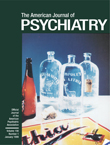Olanzapine Versus Haloperidol Treatment in First-Episode Psychosis
Abstract
OBJECTIVE: It has been hypothesized that the morbidity and mortality associated with schizophrenia can be prevented by providing effective treatment during the first episode of psychosis. Hence, the authors examined patients with first-episode psychosis to determine the efficacy and safety of olanzapine and haloperidol treatment. METHOD: A subpopulation of first-episode patients (N=83) from a large prospective, multicenter, international, double-blind, 6-week acute treatment study was evaluated. These patients were selected from a pool of 1,996 patients who had a DSM-III-R diagnosis of schizophrenia, schizoaffective disorder, or schizophreniform disorder and who also met the following criteria: 1) the length of their current psychotic episode had to be 5 or fewer years, and 2) patients had to be 45 years of age or younger at onset of first psychotic symptoms. RESULTS: Compared to haloperidol, olanzapine showed a statistically significantly greater reduction in the Brief Psychiatric Rating Scale (BPRS) total and negative scores and in the Positive and Negative Syndrome Scale total and positive scores. Clinical response (defined as 40% or greater improvement in BPRS total score from baseline) was also statistically significantly higher in olanzapine-treated patients (67.2%) than in haloperidol-treated patients (29.2%). Olanzapine-treated patients further showed statistically significant improvements in the Simpson-Angus scale and Barnes Akathisia Scale scores, while haloperidol-treated patients showed a worsening on both measures. Compared to olanzapine-treated multiple-episode patients in the parent study, olanzapine-treated first-episode patients achieved an even statistically significantly higher response. Haloperidol-treated first-episode patients experienced statistically significantly more extrapyramidal symptoms than haloperidol-treated multiple-episode patients. CONCLUSIONS: In patients experiencing first-episode psychosis, olanzapine had a risk-benefit profile significantly superior to that of haloperidol. The study results suggest that novel antipsychotic agents such as olanzapine should be considered as a preferred option in first-episode psychosis, on the basis of both safety and efficacy advantages.



